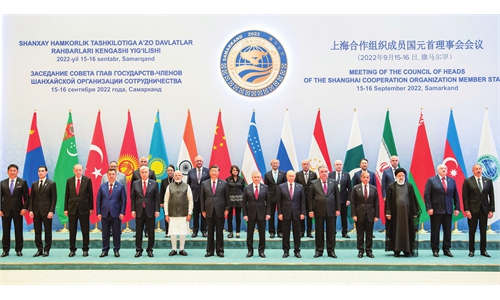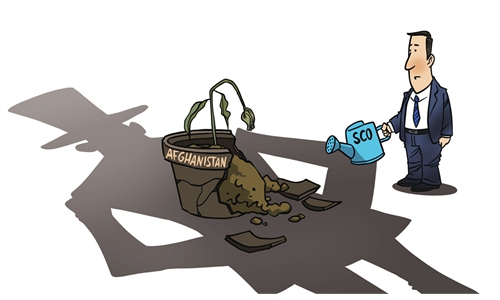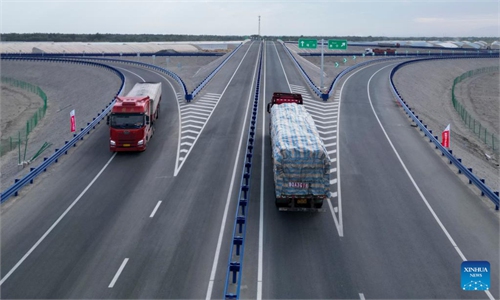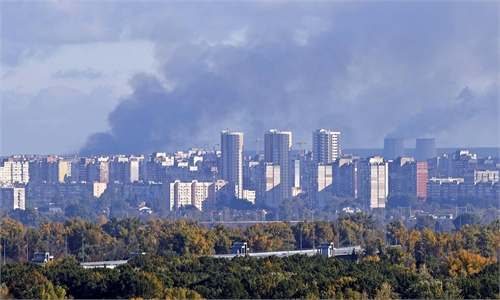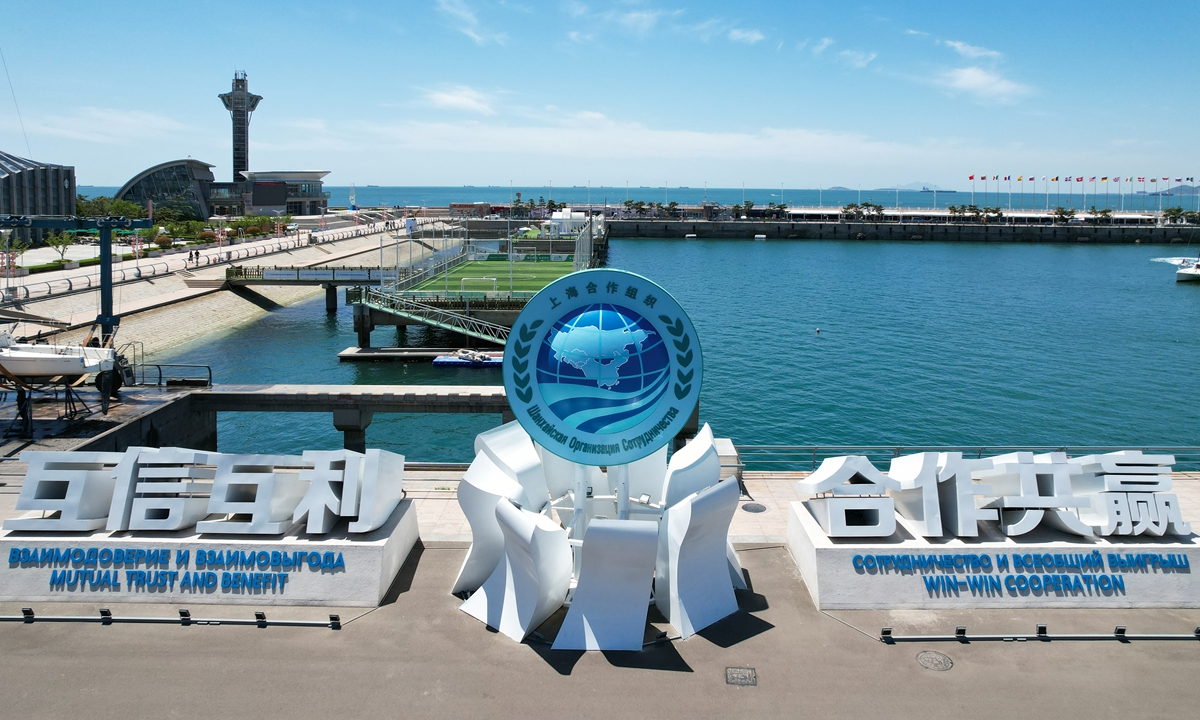
A sculpture featuring the logo of the SCO is seen in Qingdao, East China's Shandong Province. Photo: VCG
The 21st Meeting of the Council of Heads of Government of Member States of the Shanghai Cooperation Organisation (SCO) took place on Tuesday, with Chinese Premier Li Keqiang hosting the meeting in Beijing via video link. Analysts said that the Tuesday meeting will help further implement the Samarkand Declaration that member states signed in September, facilitate connectivity of regional countries and inject stability and certainty to the world.
Li made five suggestions to further promote cooperation within the SCO - to deepen cooperation on law-enforcement and security and create a stable and safe environment for development; to improve convenience for trade and investment, to boost regional economic recovery; to strengthen inter-connectivity, and to realize regional integrated development, and to safeguard the stability and resilience of the industrial chains; to improve food and energy supplies to boost sustainable development; and to improve people-to-people exchanges.
The recent 20th National Congress of the CPC showed that China will adhere to the basic state policy of reform and opening-up and the path of peaceful development, while working with other parties to promote world peace, stability, development and prosperity, Premier Li said.
China is willing to continue to deepen cooperation with all parties of the SCO, Li said.
Attendees from other SCO members recognized the results of cooperation and vowed to improve the cooperation mechanism and explore the potential for cooperation, to jointly deal with the challenges of food and energy security and climate change, according to China Central Television (CCTV).
The meeting is important as SCO members and observer states gathered again via video link to better implement the Samarkand Declaration. The Tuesday meeting was held after the conclusion of the 20th National Congress of the Communist Party of China (CPC), so SCO members and observer states can also further discuss their shared values on security and developments and to make contributions to global stability, analysts said.
Implementing consensus
The first face-to-face discussion between leaders of the SCO member states since the COVID-19 pandemic in 2020 was held in September in Samarkand, Uzbekistan and heads of state, including Chinese President Xi Jinping, Russian President Vladimir Putin and Indian Prime Minister Narendra Modi, attended the summit.
The Summit yielded fruitful achievements with leaders signing the Samarkand Declaration and releasing a number of statements and documents on safeguarding global food security, international energy security, addressing climate change, and maintaining a secure, stable and diversified supply chain.
How to implement the Samarkand Declaration is a major concern for SCO member states especially when challenges in traditional and non-traditional areas are increasing along with the Russia-Ukraine conflict, Zhu Yongbiao, executive director of the Research Center for the Belt and Road and director of the Center for Afghanistan Studies at Lanzhou University, told the Global Times.
SCO member states are concerned about increasing terror threats and how to promote regional connectivity through major projects. For example, SCO member states and regional countries are working to facilitate the railway that runs from China to Europe through Kyrgyzstan and Uzbekistan and the construction of some economic corridors, Zhu said, noting that as some countries have been hit by extreme weather events, climate change is a priority for SCO members.
Besides traditional security and development cooperation, the Samarkand Declaration contained international issues such as concern over unilateral protectionist actions that undermine the multilateral trading system. As the SCO has become more mature, it has contributed more to the international governance system and improvements to the global order, Zhu said.
The Shanghai Spirit that member states uphold shares similarities with China's understanding of development and global governance, analysts said, noting that the report of the 20th CPC National Congress includes content on the Belt and Road Initiative, regional development and upholding true multilateralism.
While elaborating multilateralism, the 20th CPC National Congress report mentioned the SCO and said that China works to see that multilateral institutions, such as the WTO and APEC better play their roles, cooperation mechanisms such as BRICS and the SCO exert greater influence, and emerging markets and developing countries are better represented and have a greater say in global affairs. It stressed that China opposes all forms of unilateralism and the forming of blocs and exclusive groups targeted against particular countries.
The Shanghai Spirit highlights developing countries' pursuit of common development which has become increasingly important in the current international environment amid hegemony and small cliques, and as more countries are choosing multilateralism and peaceful development, analysts said.
Industrial chain security
Due to the unilateral anti-Russia sanctions launched by the US and some Western countries amid the ongoing Ukraine crisis, as well as the "decoupling" and containment strategy launched by the US that aims to disrupt China's development, especially in the fields of science and technology, global industrial and supply chains have been damaged seriously, which is why SCO members are seeking their own way to resolve the problem and safeguard their development, experts said.
Deng Hao, secretary-general of the China Center for SCO Studies, told the Global Times on Tuesday that when the world is turbulent and global recovery is fragile, the SCO needs to play a role to not only stabilize regional peace and stability, but also to find solutions to boost regional economic recovery and create conditions for stable economic development.
The SCO member states should give full play to their respective advantages and learn from each other's strengths in industrial chain cooperation, which will help strengthen regional cohesion under pressure from the US and Western countries, and fully release the opportunities and dividends of mutually beneficial cooperation, Bai Ming, deputy director of the international market research institute at the Chinese Academy of International Trade and Economic Cooperation, told the Global Times on Tuesday.
"In the face of unprecedented changes unseen in a century, we should call for common security and common development, which is why it is important to advocate the Shanghai Spirit for greater cooperation while opposing unilateral sanctions and other practices that are not conducive to cooperation," Zhao Huirong, an Eastern European studies expert from the Chinese Academy of Social Sciences, told the Global Times on Tuesday.
"Because of the multilateral security and economic cooperation within the Shanghai Cooperation Organisation, every member state has a consensus and common interests, but there are still areas to be promoted, including expanding local currency settlements and the establishment of the payment system within the SCO," Zhao said.
The SCO also needs to continue to tap its internal potential with infrastructure cooperation, especially after the expansion of the SCO, experts said. The China-Kyrgyzstan-Uzbekistan railway that boosts regional transportation is a good example of that.
Despite external challenges, the internal momentum within the SCO members is strong and can be further unleashed, experts said.
With further cooperation on the supply chain between SCO member states, especially with major countries such as China, Russia and India playing a leading role, more opportunities to be unleashed will bring greater stability and sustainable development to the region and the world, experts said.
